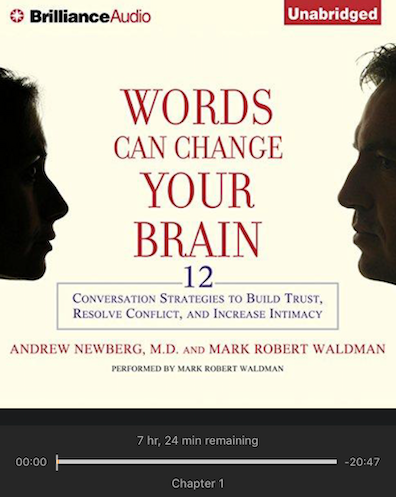Words Can Change Your Brain by Andrew Newberg and Mark Robert Waldman

I’m big on changing your brain for the better and impacting various facets of life through our actions and our mindset. Changing my brain and positively impacting my brain through the words that I use is something that is so important. I expected to learn a lot from this book and there were certainly some great actionable takeaways from it.
The book keyed on 12 things that we can do to improve compassionate communication. There were also some great exercises that the author walked me through. I was challenged to converse with someone and have a 3 second break between each word that I spoke. I find that speaking warmly, being relaxed, and observing nonverbal cues are the three most important parts of compassionate communication for myself.
12 strategies that enhance the dynamics of any conversation, even with strangers. They can stimulate deep empathy and trust in the listener’s brain and interrupt negative thought patterns that if left unchecked, can damage the brain’s emotional regulatory circuits.
The 12 strategies of compassionate communication:
1. Relax
2. Stay present
3. Cultivate inner silence
4. Increase inner positivity
5. Reflect on deepest values
6. Access a pleasant memory
7. Observe nonverbal cues
8. Express appreciation
9. Speak warmly
10. Speak slowly
11. Speak briefly
12. Listen deeply

This is something that more people need to become aware of. Especially if you study what happens in the brain of an anxious person, their brain assumes a real danger exists for non-threatening events.
When the brain perceives a negative event, it doesn’t distinguish between fantasies and facts; it assumes a real danger exists in the world.
“Even fools are thought wise if they keep silent, and discerning if they hold their tongues.” — Proverbs 17:28
I’m quiet. I’m reserved. I’m silent. I work and I observe; when I have something to say, it’s important. All of us could talk and talk and talk, couldn’t we? But why would we ever do that? To hear ourselves speak? Do that on your own time, be considerate of the people around you and be aware of what you are saying always.
When we consciously limit our speaking to 30 seconds or less, we learn to select our words more carefully. This approach creates an advantage because irrelevant speech disrupts patterns of neural coherence in the brain. Irrelevant speech also interferes with judgement and learning.
This was a wonderful example of the concept and incredibly intriguing to me. A conflict that hadn’t been resolved for years and years is quickly and easily resolved when both people simply pause between words? Sounds wonderful.

When a difficult conversation arises, it’s very very very helpful to speak super slowly. Pausing at least 2 seconds between words usually does the trick. The author shared how he and his wife resolved a disturbing event that happened 10 years earlier that they had never been able to address with a mutual satisfaction.
Speaking slowly helps to lower any anxiousness and lessens emotional intensity.
I ask myself this OFTEN. Just because we have something to say does not mean that we need to say it. I always strive to have my words pass through the 3 gates of communication. Is it true? Is it kind? Is it about the person you’re talking to? And then a bonus one, is it necessary? More here.
Both speaker and listener need to slow down enough so our inner wisdom, our intuition, can speak.
As a Shrewd Hasidic rabbi said, “when you speak, ask yourself this question: will your words improve the silence?”

This is incredible and I really shouldn’t be surprised by this. I know how God created us as people. The Bible says that God is love.
At the Institute of Neuroscience in Taiwan, they discovered that imagining a loved one promotes greater empathy and compassion for others by stimulating activity stimulating activity in the anterior cingulate and the insula. The same areas are stimulated when mothers view their smiling infants and when people engage in loving-kindness meditations.
These are wonderful questions and certainly things that we need to share with our loved ones. We don’t need to have the same values but we do need to be ware and honor their values as they should also honor ours. If they can’t or won’t do that, they probably shouldn’t be that close to us.
The author walked people through an exercise to identify our innermost values. He asks “what is your innermost value?” And has each individual write down their answer. Then, write down your other values (which he doesn’t define because values are different for each of us) and has everyone circle the value that they most connect with at that time.
In his research, he found two variations of the inner values exercise that people found to be helpful. Reflect on the following questions:
What is my deepest relationship value?
What is my deepest communication value?
Love this. Only talk about the important things, everything else just isn’t relevant or important to spend time on, why would it be?

If you are involved in a conversation and it’s clear it’s taking too long you can suggest to alternate speaking only a sentence or two. You’ll be surprised how quickly something can be laid out.
This seems almost common sense to me but then again, I’m very in tune with my emotions and don’t express them all too often. I know why I’m feeling a certain way at most times and am usually able to take emotions out of the conversation when relieving conflict.
Researchers at the University of Rochester found that the more skilled we become at regulating our emotions during conversation, the more quickly we will resolve conflicts with the least amount of stress.
This was something I enjoyed understanding and found great importance in hearing. If we are aware of what children need to hear and know so that they can learn better and become more successful over time.
Researchers at the University of Kansas recorded more than 1,300 hours of interaction between parents and children. Their findings showed a direct link between academic performance in third grade and the number of words spoken in their home from birth to age 3. Hearing about 3,000 words per hour, or 30,000 per day, resulted in children being more successful later in life. Throughout a year, some heard over 11 million words while others heard only 3 million or less. Generally, they found people with lower socioeconomic status spoke fewer than 1,000 words per hour in their home, but there was no correlation between economic status and academic performance, solely between the number of words heard in a year’s time.
Love this closing statement.
When we change our words, we change our brain, and when we change our brain, we change the way we communicate with others.

This was a book that will surely impact the way that I communicate with others, especially in periods of conflict or disagreement. I’m learning more and more just how important words are not only to others but also to myself. The words that I speak truly do impact and change my brain and they way that words are communicated does the same.
I gave this book a 4/5